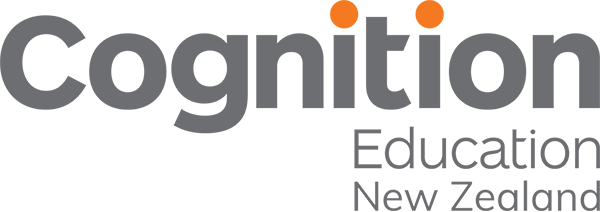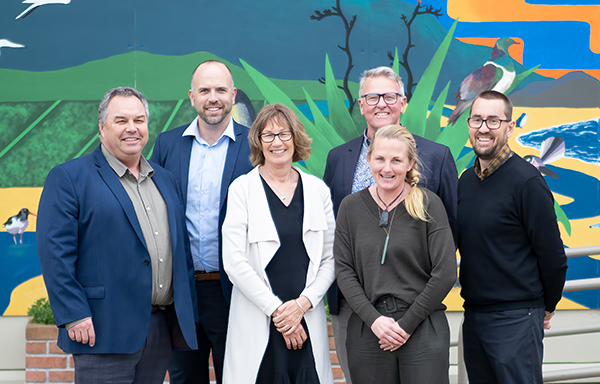Originally published by Education Gazette.
A relationship-based learning programme which features collecting authentic feedback and focusing on student and whānau voice has empowered teachers and students alike in Nelson’s Tasman district.
The Motueka Kāhui Ako has been following Dr Russell Bishop’s Teaching to the North-East approach, with a particular focus on disengaged students, since 2019. This approach, together with the Relationships First programme, sees teachers monitoring the impact of their relationships on student progress and modifying their practice where required.
John Prestidge, principal of Motueka High School and recent kāhui ako lead, explains that with the quality of the teaching relationship on one axis of an imaginary graph and the quality of teaching interventions on the other, there’s a sweet spot in the northeast corner of the graph where skilled teachers with effective student relationships result in engaged, successful ākonga.
Confronting feedback
The mahi began when the kāhui ako, which was established in 2017, was looking for a project which would be flexible and self-sustaining for each of its 13 (now 15) schools, which range from tiny rural schools to the 700-plus pupil Motueka High School.
Grant Watson, principal of Upper Moutere School, and Ali Turner, principal of Ngatimoti School, were kāhui ako leads when it was decided that the Relationships First programme combined with effective teaching strategies would be key foci.
“The families we don’t see are often those we need to see. Why wait until something goes wrong? We need to build a relationship beforehand. The proven research from Dr Russell Bishop validated our thinking about what we needed to look at,” says Ali.
“We could see that it wasn’t a one size fits all model. Each school could take it from where they were at, rather than us all being a clone of each other,” adds Grant.
Data can be collected in different ways depending on the goals each school sets:
Voice shifts (voice is collected from whānau, leaders, staff, students)
- Attendance
- Engagement
- Achievement
- Retention.
Cognition Education was commissioned to collect feedback and voice from the most disengaged students and their whānau to learn about their educational experiences.
“Schools are really data-rich places so you can look for a whole lot of flags – your attendance rates, who’s getting in trouble, who’s not achieving well – and ask, ‘Who’s giving us signs that they are disengaged from learning, or from school entirely?’” says John.
Much of the feedback reflected the quality of relationships between student, teachers, and schools in general. Comments from ākonga included: “I don’t think anybody at the school cares about me or seems to understand me.” Whānau feedback included: “My child always seems to be in trouble”, or “Nothing seems that relevant for them.”
“This can be massively confronting. But the feedback was really fascinating because one of the big precepts for the Cognition work is to reject deficit theorising: that it’s not OK for a teacher or a school to say, ‘That kid is trouble, they’ve got a tough home life, they’re hardly ever here, that’s why they’re not achieving. They need to go and sort their lives out, then I’ll be able to teach them’,” says John.
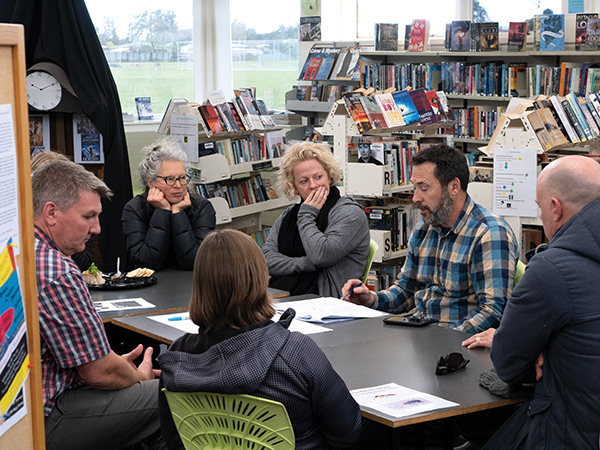
Serious data
Heidi Trott has been an across school teacher (AST) throughout the implementation of the Relationships First programme. She told Education Gazette about reactions to the first round of voice collection in 2018.
Heidi teaches at Māpua School and says that prior to the first round of voice collection, her school thought, “We do this awesomely, how could we possibly need this PD?
“But our students told us that they weren’t feeling completely comfortable with their teachers and there was enough information that we could see we did have some disengaged kids. The voice challenged our stereotypes of what disengaged looks like. We learned that the presentation of disengagement can be as individual and unique as our students themselves. We set some annual and term goals to work on those issues.
“When we collected voice a year later, the voice had completely changed. There were new things that were unearthed for lots of reasons – we’d just been through our first Covid lockdown. But we completely changed our voice focus after that – it encouraged us to continue to look at voice as a serious set of data,” she says.
Impact Coaching
Professional development (PD) for the kāhui ako has included learning about strategies and approaches teachers can use to improve their relationships with students and increase capacity to move their practice to the northeast corner.
In Impact Coaching, trained coaches identify positive examples of relationship-building strategies in the classroom, while also looking at things that might be getting in the way of those relationships. The coaches engage in a series of observation and coaching cycles – a cooperative and collaborative model which can eventually be mirrored between teacher and student.
To keep the project self-sustaining, the mechanisms of the kāhui ako: across school teachers (AST) and within school teachers (WST) have been used to lead peer to peer Impact Coaching.
“It gives teachers time to stop and reflect with an independent person. It doesn’t have to go into your appraisal, principals didn’t know what those conversations were. It was non-judgemental,” says Ali.
“Voice is one piece of the data: there’s all the other data – specific things you should be looking at. When you have any alarm bells going off in those areas, everything else is designed to help lift that, whether it be Impact Coaching, PD around effective teaching strategies, or Northeast Hui (group coaching meetings) to focus on priority students or collecting voice to monitor what’s going on,” explains Heidi.
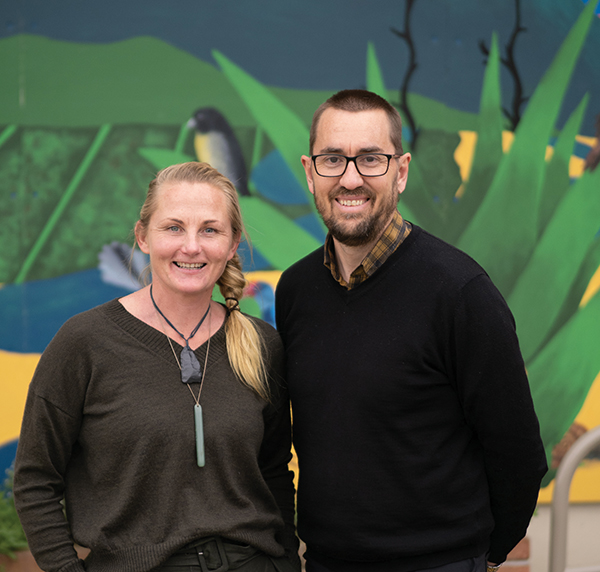
Mind shift
Many of the Motueka schools and kura have now done three annual rounds of voice collection and John says there has been a noticeable mind shift for staff.
There was a change from deficit thinking to, ‘OK, I’m having trouble engaging the student, we need to find more relevance for them’, and ‘What needs to be fixed for the student before they can come to my class?’
“It was a really good mind shift and that is indicative of the northeast corner – the teacher and the school have to manage that relationship,” he says.
Hearing the disengaged student voice has been powerful, says Ali.
“We use lots of different mechanisms to allow voice. It’s often a class-by-class approach, or circle time, or, what’s fed through your student council.
“For example, we had a student who wasn’t progressing. I asked him what was going on and he said that he couldn’t read the teacher’s handwriting when she marked his work. It was such a simple thing to ensure he can read the teacher’s handwriting and he felt really good that I was able to intervene.
“It’s about empowering students and teaching them how to approach things respectfully. It’s not just a one-off, it’s growing a school culture that shows teachers are prepared to listen,” she says.
Shared responsibility
Head of English at Motueka High School and across school teacher Nich Campbell has been teaching for 20 years and says that at the beginning of his career, he was advised “not to smile before Easter”. Now he doesn’t have a teacher’s desk in his classroom so that the power dynamic is more evenly shared.
“The interesting thing about the Relationships First programme is you have a good relationship, but it’s built on some good pedagogical experience and practice. That means I’m going to have a strong relationship with that student but I’m not just there to be a friend. I’m actually going to have high expectations, which is another part of that profile.
“Now I can still control my classroom and make sure that everybody is safe and on focus. It’s MUCH nicer teaching than when I started teaching. The students still look to you as a teacher for that understanding and knowledge and you are using that experience and structure but also thinking ‘how do students feel they can be part of that process as well?’” he says.
While the number of priority students has not decreased overall, Grant and Ali believe that teachers know how to handle them better and agree that a powerful part of Relationships First for teachers is the collegiality.
“Teachers will go and talk with other teachers first – saying ‘Johnny is always late, is his brother always late too?’ They’ll have a shared discussion about who will ring Mum. They’re not taking it on themselves to do everything – we’ve always done a bit of that, but it helps teachers to be more proactive,” says Ali.
“The strongest thing is that it’s now ‘we’,” says Grant. “Because when I was in the classroom it was my problem and then you would pass the tricky students on at the end of the year, or the deputy principal got the behaviours, but we now say ‘these are our kids’.”
Next steps
Has this kāhui ako-wide mahi met, or exceeded, expectations?
“We started thinking we were on a trajectory – teaching to the northeast corner – and of course we’re still on that, but it’s much wider than a line heading in one direction because lots of other things have fallen out which have enabled more positive relationships,” Ali replies.
Better systems include primary schools and the high school working more closely on transition, co-construction meetings within schools, and teachers within and across schools sharing concerns and problem-solving about students.
Tim de Vries, principal of Tasman Bay Christian School, is the new kāhui ako lead and says that while each school is at a different stage of their journey, most are beginning part 3 – monitoring and assessing the impact of Relationships First. The next focus will be on embedding and sustaining Teaching to the North-East.
“It’s about taking it beyond just the school walls so boards and our communities understand the process – not just about the strong relationships but our powerful teaching work as well. And it’s about providing opportunities for teachers in our kāhui ako to find experts so we can find shared threads and come together and learn,” he says.
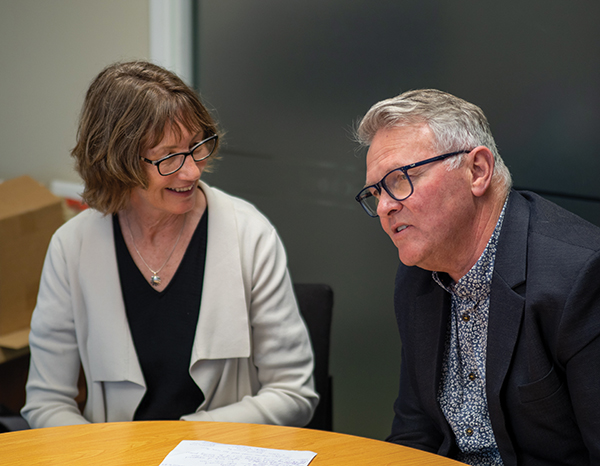
Sustainable pedagogy
Teaching to the North-East is based on Dr Bishop’s work, Culture Counts, which recognises the importance of cultural identity in schools and for learners. The approach informs teaching practices which utilise students’ prior knowledge and language, rather than treating these as barriers to learning.
Relationships First is a culturally responsive practice that focuses on accelerating and sustaining the achievement outcomes of indigenous and marginalised students.
The programme is divided into three parts:
- Relationships for learning
- Effective teaching pedagogies
- Tracking and monitoring the impact of the approach.
Based on Dr Bishop’s Te Kotahitanga(external link), the collection of rich data and peer coaching aims to help schools reach sustainability.
Te Kotahitanga was a Ministry-funded PD programme throughout the 2000s that:
- supported teachers to improve Māori students’ learning and achievement, enabling them to create a culturally responsive context for learning which is responsive to evidence of student performance and understandings
- enabled school leaders, and the wider school community, to focus on changing school structures and organisations to more effectively support teachers in this endeavour.
“It’s more than cultural competence, the focus of our work has been on relationship-based learning – the underpinning philosophy and pedagogy which resonates with all of us. A big part of that is that what is good for Māori students is good for all students,” concludes John.
